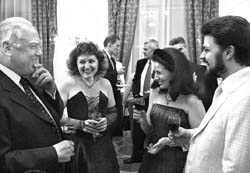Rachmaninoff: Diplomatic Etude

April 1 marked the 130th anniversary of birth of great composer, pianist, and conductor Sergey Rachmaninoff, and March 28 — 60 years since his death. This is why the soiree dedicated to his memory began on a respectfully mournful note. The Trio elegiaque for piano, violin, and cello was performed by excellent musicians, representatives of Ukrainian school of music, Hanna Seredenko, Oles Semchuk, and Vitaly Borovyk. The history of this composition is connected with Kyiv. In 1893 Rachmaninoff was invited to conduct his opera, Aleko. The premiere was a success. On his way back to Moscow the composer received sorrowful news about a sudden disease and then death of PСtr Tchaikovsky whom he believed the greatest authority in their profession. Sergey Vasilyevich recalled that, thunderstruck by the news, he suddenly heard a combination of three iterative notes. Tchaikovsky’s words were clearly heard in this music, “Regretting the past, believing in the future, never being satisfied with the present...” This is how the Trio elegiaque was born, which the maestro dedicated to the memory of the great musician. The melody grew and became broader in the fatal key of D minor. For a month and a half the whole course of Rachmaninoff’s life paused. All his efforts and thoughts were devoted to the song about his departed friend. “For an artist, the end of his mundane life is nothing but its start... My time has not yet come... It’s so far ahead that I won’t see it during my lifetime...”
“There are stars for all times. They have always been and always will be contemporary. Great composers, like Mozart, Tchaikovsky, or Rachmaninoff, belong to this rank,” chairman head of the Composers’ Union of Ukraine Mykhailo Stepanenko. “There were thousands of wonderful composers in the twentieth century: Prokofiev, Shostakovich... But Rachmaninoff is special. All his compositions are permeated with love... When one listens to his music, it’s like a justification of mankind before God. An excellent pianist, Rachmaninoff composed his music relying on his own virtuoso technique as a conductor and musician. (His contemporaries compared him to Liszt, forgetting that the latter ended his career as a pianist at 38, while Rachmaninoff retained his mastery until old age — Author). It is very hard to conform to Sergey Vasilyevich’s level. Thus, if a performer includes his works in his or her repertory, he has to demonstrate the limits of his skills. Rachmaninoff’s music is performed often, but one can rarely see a performance truly equal to the original text. I recall a concert which has played a significant role in my own life. Richter played Rachmaninoff’s preludes in Kyiv. It was fantastic! His diapason ranged from three pianos to four fortes, making the chandeliers shake.
“Today, when our world is half conquered by television, true musical culture seems to be losing its point. Rachmaninoff’s music is like spring water. One can like wine or cola, but without clear water life is impossible. Rachmaninoff’s is a music of life and hope.
“We should also be grateful to Rachmaninoff for his active participation in founding the Kyiv Conservatory. In 1913 he was among the leaders of the Russian Music Society. He contributed to the fact that the Kyiv Music College headed by Pukharsky received the status of an institution of higher education. Recently I read the diary of one of our first rate composers, Lev Revutsky. He wrote about his impressions of Rachmaninoff playing his Third Concert at the Kyiv Philharmonic. Revutsky writes about his delight with this wondrous music and its author’s magnificent performance. Rachmaninoff’s influence on Ukrainian music was very strong. It can be felt in both Revutsky and Kosenko’s creative work, in their vivid melodic quality.
“Virtually every singer performs Rachmaninoff’s music. Though it is very melodious, these are not songs. They are more than simply songs. With his vocal compositions Rachmaninoff depicts the subtlety of the Slavic soul. Incidentally, one of his best romantic pieces was written to Shevchenko’s “I fall in love to my misfortune.” There are many good songs based on Shevchenko poetry, but few beautiful romances.
“The maestro was frequently asked how he created his compositions. He would answer concisely, “I hear them.” But once he did confess, “When I compose, the memory of a recently read book comes in handy, or a beautiful painting, or a poem. Sometimes a certain plot appears in my mind, which I try to convert into sound...”
A true present to music lovers was appearance of a wonderful duet of Hanna Seredenko (piano) and Oles Semchuk (violin) at the embassy concert. Both are professionals and refined musicians who succeed in reproducing Rachmaninoff’s aesthetics. Seredenko and Semchuk decently represent our country in Europe. A few years ago, when Oles left to Italy, it seemed that the duet had broken up forever, since his schedule is very tight. Semchuk teaches the Preparing Laureates for International Contests course at the Florence School of Music. However, Hanna, who teaches at the National Music Academy of Ukraine, and Oles manage to combine pedagogy with tours. A few days ago they returned from a tour to Russia, and on May 6 the duet is to play Beethoven at the Lysenko Hall of Columns.
A garland of Rachmaninoff’s romances written in various years was performed at the soiree by Liudmyla Voinarovska. In the words of Viktor Chernomyrdin, the embassy will keep up with this wonderful tradition of diplomacy in the form of musical soirees by inviting outstanding Ukrainian and Russian artists.






